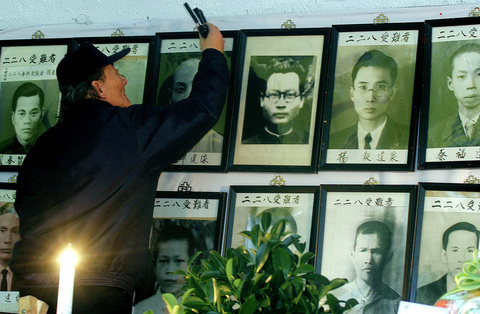Amid discussions over who should be held responsible for the Feb. 28 Incident in 1947 -- a debate generated by the upcoming 228 Peace Memorial Day -- a group of second-generation Mainlanders said that the politicization of issues will not bring about harmony between ethnic groups in Taiwan.
To commemorate the 58th anniversary of the massacre, the 228 Incident Memorial Foundation yesterday released a report which blamed the tragedy on former ROC president Chiang Kai-shek (蔣介石) and former Taiwan governor Chen Yi (陳儀).

PHOTO: SEAN CHAO, TAIPEI TIMES
"Although Taiwan is now a democracy and the 228 Incident is no longer taboo, discussions on related issues often fall into conflicts among political parties," said Chou Yong-hong (周永鴻), director of the Mainlander Association, a group founded by second-generation Mainlanders to promote harmony between ethnic groups.
To better understand the connection between the 228 Incident and ethnic relations, the Mainlander Association released yesterday the results of a telephone survey the group conducted last month, making 1,000 random phone calls in Taipei City and Taipei County residents.
According to the survey, about 40 percent of the participants said that discussing 228 Incident-related issues deepens the ethnic split between Mainlanders and native Taiwanese. However, 30 percent said that discussions help build a bridge between ethnic groups.
While split over whether talking about the 228 incident helps ethnic relations, the survey showed that more than 80 percent of the respondents agreed that tensions between ethnic groups are a result of political maneuvering. Further, over 50 percent think that ethnic tension is a serious problem in Taiwan.
In addition, more than 40 percent said that, as an ethnic group, Mainlanders are losing their political influence.
Chief executive director of the association, Huang Luo-fei (黃洛斐), said that characterizing the 228 Incident as a conflict between victims and perpetrators paints Mainlanders as those who are guilty of the massacre.
"In talking about the 228 Incident, it is crucial to focus on the individuals who were involved in the tragedy." Huang said.
"Accusing an ethnic group of a historical crime is not the solution to ethnic conflict," Huang added.
While approving the foundation's efforts to find the truth of the 228 Incident, Huang called on all ethnic groups to share their experiences.
"The history of the 228 Incident is shared by all the ethnic groups in Taiwan. Only by sharing our experiences and trying to reach a mutual understanding can we heal the still-festering wounds caused by the tragedy," Huang said.

CHANGING LANDSCAPE: Many of the part-time programs for educators were no longer needed, as many teachers obtain a graduate degree before joining the workforce, experts said Taiwanese universities this year canceled 86 programs, Ministry of Education data showed, with educators attributing the closures to the nation’s low birthrate as well as shifting trends. Fifty-three of the shuttered programs were part-time postgraduate degree programs, about 62 percent of the total, the most in the past five years, the data showed. National Taiwan Normal University (NTNU) discontinued the most part-time master’s programs, at 16: chemistry, life science, earth science, physics, fine arts, music, special education, health promotion and health education, educational psychology and counseling, education, design, Chinese as a second language, library and information sciences, mechatronics engineering, history, physical education

DEADLOCK: As the commission is unable to forum a quorum to review license renewal applications, the channel operators are not at fault and can air past their license date The National Communications Commission (NCC) yesterday said that the Public Television Service (PTS) and 36 other television and radio broadcasters could continue airing, despite the commission’s inability to meet a quorum to review their license renewal applications. The licenses of PTS and the other channels are set to expire between this month and June. The National Communications Commission Organization Act (國家通訊傳播委員會組織法) stipulates that the commission must meet the mandated quorum of four to hold a valid meeting. The seven-member commission currently has only three commissioners. “We have informed the channel operators of the progress we have made in reviewing their license renewal applications, and

The High Prosecutors’ Office yesterday withdrew an appeal against the acquittal of a former bank manager 22 years after his death, marking Taiwan’s first instance of prosecutors rendering posthumous justice to a wrongfully convicted defendant. Chu Ching-en (諸慶恩) — formerly a manager at the Taipei branch of BNP Paribas — was in 1999 accused by Weng Mao-chung (翁茂鍾), then-president of Chia Her Industrial Co, of forging a request for a fixed deposit of US$10 million by I-Hwa Industrial Co, a subsidiary of Chia Her, which was used as collateral. Chu was ruled not guilty in the first trial, but was found guilty

Taiwan People’s Party (TPP) Chairman Huang Kuo-chang (黃國昌) yesterday appealed to the authorities to release former Taipei mayor Ko Wen-je (柯文哲) from pretrial detention amid conflicting reports about his health. The TPP at a news conference on Thursday said that Ko should be released to a hospital for treatment, adding that he has blood in his urine and had spells of pain and nausea followed by vomiting over the past three months. Hsieh Yen-yau (謝炎堯), a retired professor of internal medicine and Ko’s former teacher, said that Ko’s symptoms aligned with gallstones, kidney inflammation and potentially dangerous heart conditions. Ko, charged with